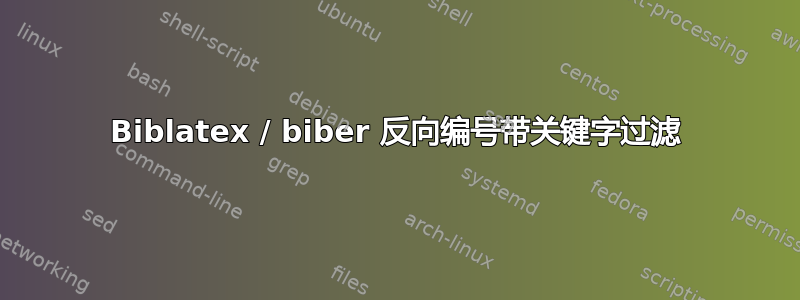
我对 (流行的) biblatex 更改感到困惑,2016 年的升级导致反向标签无法正常工作。有人提供了按类型过滤的解决方案这里和这里。此解决方案声称可以用于关键字过滤,但不能用于反向编号。以下是我的 MWE,它没有产生所需的结果,其应如下所示:
Foo
[F2] x y. “b”. In: j (1995).
[F1] x y. “a”. In: j (1990).
Bar
[B2] x y. “d”. In: j (2005).
[B1] x y. “c”. In: j (2000).
具体来说,1)按命令顺序定义的顺序\nocite{a},或者如果这不是一个选项,则按时间倒序排列,2)按关键字过滤,3)使用labelprefix。
如果有人可以提供一些代码/建议来实现上述功能,我将不胜感激。
\documentclass{article}
\usepackage[style=numeric,
sorting=none,
% sorting=ydnt % prefer to sort manually w/ \nocite commands
backend=biber,
]{biblatex}
\begin{filecontents*}{\jobname.bib}
@article{b, author={x y}, title={b}, journal={j}, year=1995, keywords={foo}}
@article{a, author={x y}, title={a}, journal={j}, year=1990, keywords={foo}}
@article{c, author={x y}, title={c}, journal={j}, year=2000, keywords={bar}}
@article{d, author={x y}, title={d}, journal={j}, year=2005, keywords={bar}}
\end{filecontents*}
\addbibresource{\jobname}
\AtDataInput{%
\csnumgdef{entrycount:\strfield{keywords}}{%
\csuse{entrycount:\strfield{keywords}}+1}}
\DeclareFieldFormat{labelnumber}{\mkbibdesc{#1}}
\newrobustcmd*{\mkbibdesc}[1]{%
\number\numexpr\csuse{entrycount:\strfield{keywords}}+1-#1\relax}
\begin{document}
Some text w/o citations.
% foo in reverse chronological order
\nocite{b} \nocite{a}
% bar in reverse chronological order
\nocite{d} \nocite{c}
\newrefcontext[labelprefix=F]
\printbibliography[keyword=foo, title=Foo]
\newrefcontext[labelprefix=B]
\printbibliography[keyword=bar, title=Bar]
\end{document}
答案1
我可以通过一些小改动生成您想要的输出。话虽如此,我不确定该解决方案是否足够通用,可以满足实际目的。更改如下:
biblatex使用defernumbers选项加载- 使用
\jobname.bib代替\jobname作为 bib 资源(否则 biber 使用\jobname.tex作为 bib 资源 entrycount:*仅当labelprefix字段为空时才步进值entrycount为所有关键字定义一个
得到的 MWE 为:
\documentclass{article}
\usepackage[style=numeric,
sorting=none,
% sorting=ydnt % prefer to sort manually w/ \nocite commands
backend=biber,defernumbers,
]{biblatex}
\begin{filecontents*}{\jobname.bib}
@article{b, author={x y}, title={b}, journal={j}, year=1995, keywords={x, foo}}
@article{a, author={x y}, title={a}, journal={j}, year=1990, keywords={foo, x}}
@article{c, author={x y}, title={c}, journal={j}, year=2000, keywords={bar, y}}
@article{d, author={x y}, title={d}, journal={j}, year=2005, keywords={y, bar}}
\end{filecontents*}
\addbibresource{\jobname.bib}
\makeatletter
\define@key{blx@bib1}{keyword}{\xdef\mykeyword{#1}}
\makeatother
\newcommand{\stepKeywordCount}[1]{\csnumgdef{entrycount:#1}{\csuse{entrycount:#1}+1}}
\AtDataInput{%
\iffieldundef{labelprefix}{%
\begingroup%
\edef\mytemp{\strfield{keywords}}
\expandafter\forcsvlist\expandafter{\expandafter\stepKeywordCount\expandafter}\expandafter{\mytemp}%
\endgroup%
}{}%
}%
\DeclareFieldFormat{labelnumber}{\mkbibdesc{#1}}
\newrobustcmd*{\mkbibdesc}[1]{\number\numexpr\csuse{entrycount:\mykeyword}+1-#1\relax}
\newcommand{\mykeyword}{}
\begin{document}
Some text w/o citations.
% foo in reverse chronological order
\nocite{b} \nocite{a}
% bar in reverse chronological order
\nocite{d} \nocite{c}
\newrefcontext[labelprefix=F]
\printbibliography[keyword=foo, title=Foo]
\newrefcontext[labelprefix=B]
\printbibliography[keyword=bar, title=Bar]
\end{document}


